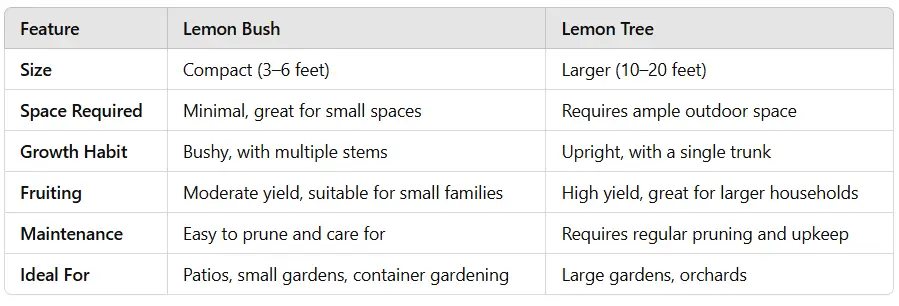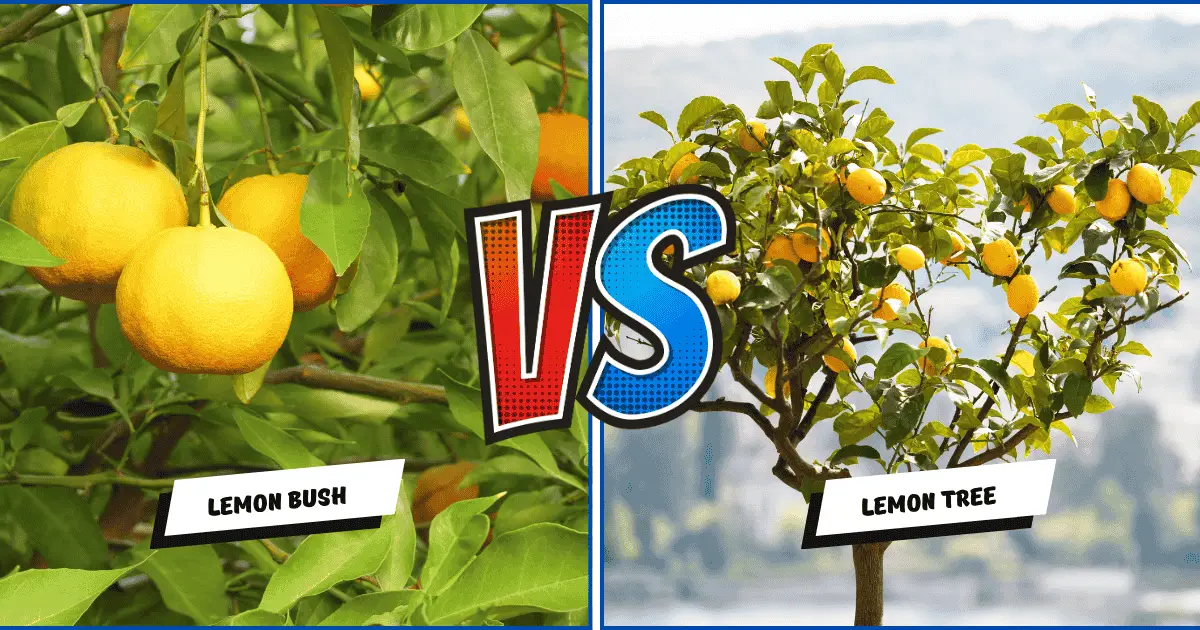If you’re considering growing lemons, you may wonder whether a lemon bush or a lemon tree is the right choice for your garden. Both options have unique characteristics, growing requirements, and benefits. This article explores the differences between lemon bushes and lemon trees to help you make an informed decision, whether you’re a seasoned gardener or a beginner.
What Is a Lemon Bush?
A lemon bush refers to a lemon plant grown in a compact, bushy form. Unlike a traditional lemon tree, which grows upright and tall, a lemon bush is typically pruned to remain small and spread out horizontally. They’re perfect for small gardens, patios, or even as container plants indoors
Key Characteristics of Lemon Bushes:
- Size: Typically 3–6 feet tall.
- Shape: Bushy, compact, and ideal for smaller spaces.
- Maintenance: Easier to prune and maintain due to its size.
- Fruiting: Produces lemons year-round, depending on the variety and care.
- Location: Often grown in pots or small garden beds.
Lemon Bush vs Lemon Tree: A Side-by-Side Comparison

Choosing Between a Lemon Bush and Lemon Tree
Consider Your Available Space
- Lemon Bush: Perfect for small gardens, balconies, or patios. Their compact size makes them suitable for growing in containers, which can also be moved indoors during colder months.
- Lemon Tree: Requires a spacious garden and thrives best in warm climates. Ideal for those with plenty of outdoor space.
Climate and Growing Conditions
- Lemon Bush: Hardy and adaptable. Can be brought indoors or into greenhouses if the temperature drops.
- Lemon Tree: Requires a stable, warm climate with minimal frost. Some varieties are less cold-tolerant and may need protection in winter.
Desired Lemon Yield
- Lemon Bush: Produces enough fruit for personal use. If you’re a small household or only need lemons occasionally, a bush is sufficient.
- Lemon Tree: Provides a larger yield, perfect for those who want an abundant supply for cooking, juicing, or selling.
Popular Lemon Varieties for Bushes and Trees
Lemon Bush Varieties:
- Meyer Lemon: A dwarf variety known for its sweeter taste and prolific fruiting.
- Lisbon Lemon: Compact and hardy, perfect for pots and small gardens.
- Eureka Lemon: A favorite for its year-round fruit production.
Lemon Tree Varieties:
- Ponderosa Lemon: Produces large, fragrant lemons on a taller tree.
- Variegated Pink Lemon: Unique striped fruit with pink flesh, ideal for ornamental purposes.
- Improved Meyer Lemon: A slightly larger version of the Meyer Lemon, suitable for traditional tree growth.
Growing and Caring for Lemon Bushes and Lemon Trees
Soil Requirements
Both lemon bushes and trees thrive in well-drained, sandy loam soil with a slightly acidic pH (6.0–7.0). Ensure the soil is rich in organic matter for optimal growth.
Sunlight
Lemons love the sun! Provide 6–8 hours of direct sunlight daily for both bushes and trees. If growing indoors, place your lemon bush near a sunny window or use grow lights.
Watering
- Lemon Bush: Water more frequently, especially in containers, as pots dry out faster.
- Lemon Tree: Water deeply once or twice a week, depending on weather conditions.
Pruning
- Lemon Bush: Prune lightly to maintain shape and encourage new growth.
- Lemon Tree: Regular pruning is essential to remove dead branches and promote airflow.
Pest and Disease Management
Common Pests:
- Aphids: Small sap-sucking insects that can damage leaves.
- Scale Insects: Look like small bumps on stems and leaves.
- Citrus Leaf Miners: Cause curling and discoloration of leaves.
How to Prevent Pests:
- Use neem oil or insecticidal soap.
- Keep your plants well-maintained and healthy to resist infestations.
Common Diseases:
- Root Rot: Caused by overwatering or poor drainage.
- Citrus Canker: A bacterial infection leading to leaf spots and fruit blemishes.
How to Prevent Diseases:
- Ensure proper watering and drainage.
- Remove infected leaves or fruit immediately.
Tips for Growing Lemon Bushes Indoors
If you live in a cooler climate, growing a lemon bush indoors is a great option. Follow these tips for success:
- Choose a Dwarf Variety: Meyer lemons are an excellent choice for indoor growth.
- Pot Selection: Use a pot with good drainage holes and fill it with high-quality potting mix.
- Humidity: Keep the humidity levels high by misting the plant regularly or placing a tray of water nearby.
- Lighting: Invest in a grow light if natural sunlight is limited.
Benefits of Lemon Bushes and Lemon Trees
Lemon Bush Benefits
- Compact and easy to manage.
- Can be grown indoors or in small spaces.
- Produces fruit year-round in optimal conditions.
Lemon Tree Benefits
- Larger yield for heavy lemon use.
- Adds beauty and shade to large gardens.
- Long lifespan, with trees living up to 50 years or more.
Final Thoughts: Which Is Right for You?
The choice between a lemon bush and a lemon tree depends on your gardening goals, available space, and climate. If you’re looking for a compact, low-maintenance plant that fits into smaller spaces, a lemon bush is the perfect option. On the other hand, if you have ample space and want a high-yield plant, a traditional lemon tree is an excellent investment.
No matter which option you choose, caring for lemon plants can be incredibly rewarding. Their vibrant green foliage, fragrant blossoms, and delicious fruit bring life and zest to any garden. Happy gardening!
FAQs About Lemon Bushes vs Lemon Trees
Q1: Can I grow a lemon bush indoors?
Yes, lemon bushes, especially dwarf varieties like Meyer lemons, are ideal for indoor gardening. Place them near a sunny window or use grow lights to provide adequate light.
Q2: How much space does a lemon tree need?
Lemon trees typically require about 10–15 feet of space between trees to grow healthily. Ensure they are planted in a location with ample room for their roots and canopy.
Q3: Which is better for a small patio, a lemon bush or a lemon tree?
A lemon bush is better suited for small patios because of its compact size and ability to grow well in containers.
Q4: Do lemon bushes produce fruit as well as lemon trees?
While lemon bushes yield less fruit than full-sized lemon trees, they produce enough for personal use, especially with good care and maintenance.
Q5: What is the lifespan of a lemon bush compared to a lemon tree?
Lemon bushes typically live for 10–20 years, while lemon trees can live for 50 years or more with proper care.
Q6: Can I prune a lemon tree to keep it small?
Yes, with consistent pruning, you can control the size of a lemon tree, but it may still require more space than a lemon bush.
Q7: Do both lemon bushes and trees require full sun?
Yes, both need 6–8 hours of direct sunlight daily to thrive. If grown indoors, provide artificial lighting to supplement natural light.
Q8: Which variety of lemon is best for growing as a bush?
Dwarf varieties like Meyer lemons and Lisbon lemons are excellent for growing as bushes, thanks to their compact growth habits.
Q9: How often should I water a lemon bush or tree?
- Lemon Bush: Water more frequently, especially when grown in pots, as the soil tends to dry out faster.
- Lemon Tree: Water deeply once or twice a week, depending on weather conditions and soil drainage.
Q10: Can I grow a lemon tree in a pot?
Yes, dwarf lemon trees can be grown in pots, but they may not reach their full potential height. Choose a large pot with good drainage to accommodate the tree’s root system.
Q11: What is the difference between Meyer lemons and regular lemons?
Meyer lemons are sweeter and less acidic compared to regular lemons like Eureka or Lisbon varieties. They are also smaller in size and have thinner skin.
Q12: Are lemon bushes easier to care for than lemon trees?
Yes, lemon bushes are generally easier to maintain due to their smaller size and minimal space requirements.
Q13: Can I use the same soil for both lemon bushes and lemon trees?
Yes, both thrive in well-drained, slightly acidic soil with a pH between 6.0 and 7.0. Adding organic compost improves soil quality.
Q14: What pests are common for lemon plants?
Common pests include aphids, scale insects, and citrus leaf miners. Use neem oil or insecticidal soap to manage infestations.
Q15: Which option is more cost-effective: a lemon bush or a lemon tree?
Lemon bushes are typically more affordable and cost-effective for small-scale gardening. Lemon trees may require a larger initial investment and ongoing maintenance.


